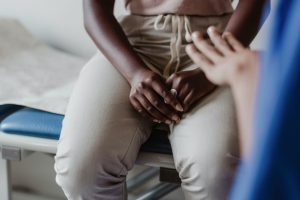New research shows the hurdles that victims of sexual violence face when trying to access support

Eight in 10 women seeking support after sexual violence are being diagnosed with psychiatric disorders – even when they express the belief that their symptoms are the result of trauma.
Almost eight in 10 women seeking support after experiencing sexual violence are being diagnosed with psychiatric disorders, new research has revealed.
The report, by Victim Focus, an organisation which works to change the way victims of abuse, violence and trauma are portrayed and supported, found that many women felt they needed to accept diagnoses and medication they didn’t agree with in order to access therapy.
Based on the experiences of 395 women, the 105-page report demonstrates the numerous barriers sexual violence survivors face when seeking support – including stigma, stereotypes and “an increasingly underfunded and over-medicalised view of their trauma”.
Indeed, while some women in the study felt that their diagnosis validated their experiences and helped them feel more in control in the face of their trauma, others felt like their diagnosis led to their sexual trauma being brushed off or explained away.
“I was in and out of A&E and received no formal support until I accepted the BPD [borderline personality disorder] label which allowed me to get treatment in a therapeutic community,” one of the women said. “I never believed the BPD label, but it was the only way to access the support.”
Out of the diagnoses received by women involved in the study, the most common were depression (63%), anxiety disorder (53%), PTSD (42%) and BPD (14%). A further 17% said they’d never been formally diagnosed, while one in 10 women said they refused to accept their diagnosis.
Dr Jessica Taylor, a leading psychologist, author and CEO of Victim Focus, who wrote the report alongside Carrie-Anne Bailey, said the experiences of the women involved in the pair’s research suggested that sexual trauma is not seen as a “legitimate response” to sexual violence.
“Instead, women are given labels of mental disorders and encouraged to take medication, which will do nothing to process the sexual violence they have been subjected to,” Dr Taylor told Stylist. “Many women told us that they knew the root cause of their symptoms was the sexual trauma, but knew that they had to accept a mental disorder diagnosis in order to get therapy or further support.”
While providing women with mental health diagnoses where appropriate is necessary, Dr Taylor believes it’s time that those suffering from sexual trauma have their experiences validated.
“We have already had GPs comment on our report and say that they see this happen all the time, and women come to them with multiple psychiatric disorders on their files, but no mention of the rapes or abuse or trauma,” Dr Taylor explains.
“This positions women as mentally ill and disordered rather than validating their very real sexual trauma from rape and abuse.
“Women need to be able to process and discuss their trauma without being labelled mentally ill or being convinced that there must be something wrong with them. There is a huge need for trauma education and information for women and girls, as it is so common to be subjected to sexual violence, sexual trauma will also be extremely common.”
In a statement, an NHS spokesperson said: “We have 24-hour support in place for anyone who needs support through our Sexual Assault Referral Centres (SARCs) which offer confidential specialist, practical, medical and emotional support to anyone who has been sexually assaulted – regardless of when the incident happened. The NHS’ world-class talking therapy service (IAPT) also supported over a million people with mental health conditions such as anxiety, depression and PTSD in 2020/21.
“We are also investing an extra £20 million in sexual assault and domestic violence services over the next three years to provide even more support for victims and survivors.”
Sexual assault referral centres provide a safe space and dedicated care for people who have been raped, sexually assaulted, or abused. If you have been raped, sexually assaulted or abused and don’t know where to turn, search “sexual assault referral centres” to find out more or visit www.nhs.uk/SARCs to find your nearest service.
Image: Getty
Source: Read Full Article